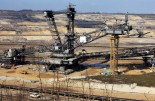Han Dieperink: Record demand for oil
Han Dieperink: Record demand for oil

This column was originally written in Dutch. This is an English translation.
By Han Dieperink, written in a personal capacity
Demand for oil has risen to record levels. Despite the weak Chinese growth, 103 million barrels are now being burned per day: a new all-time high.
The reopening of China plays a role in this, but the demand from other non-OECD countries is particularly striking. The vast majority of OECD countries are developed countries that consume about 50% of all oil, but are home to only 18% of the world's population. Due to moderate economic growth, higher prices and the energy transition, the demand for oil in these countries is barely growing.
In the rest of the world, the energy transition is a luxury problem. They have long been happy that they have access to cheap (Russian) energy. The widening price differentials in energy resulting from the boycott of Russia are causing energy-intensive activity to shift to countries outside the OECD. There are also more flights with airlines from non-OECD countries. The extra demand is therefore mainly due to emerging countries that prioritize their energy supply over the energy transition.
Insufficient investments
For years, insufficient investments have been made in the extraction of oil. In that respect, it is still great that so much oil is being produced. There has also been insufficient investment in refineries for many years, with the result that the refining margins have been much better in recent years than before. In addition, many refineries can only process a certain type of oil.
Due to the boycott of Russian oil, there is now friction in the market. In addition, the demand for diesel and kerosene (petroleum) in particular is rising sharply. As a result, more oil has to be processed in refineries. That is now 83.2 million barrels per day, an increase of 2.5 million barrels per day compared to a year ago. The demand for diesel is strongly related to economic activity, while kerosene (petroleum) is used together with fuel oil as an alternative to the expensive natural gas in Europe. Furthermore, kerosene naturally benefits from the sharp increase in air traffic post-Covid.
Lack of capacity and low stocks
The fact that the market for oil and oil products is tight is also apparent from the current logistical problems. Refineries effectively have to run at full capacity to meet demand, but due to the extreme heat and the start of the hurricane season, this is not always possible. So it can happen that a strong hurricane can cause a sharp rise in petrol prices, for example. Refining capacity will be added, but production from it is not expected before the end of 2024. Stocks, whether strategic or not, are still low.
Growing power of OPEC
In years when OPEC's market position is growing, the price of oil usually rises. In theory, the cartel only needs to reduce oil production by 10% for the oil price to double. However, much depends on the discipline within the cartel. At the moment, OPEC has cut production several times. In July it was 1 million barrels per day less and August is probably even lower. Together with previous production cuts, OPEC now has a spare capacity of about 5 million barrels per day. That is the highest level in 20 years (apart from the corona period).
The result is mainly reflected in the oil term curve. In the short term, prices will remain high, but further out in time, oil will become cheaper. Now oil is usually 'in backwardation' and the consequence of the current OPEC strategy is that the curve is becoming more inverted. For investors who buy oil forward, this means a higher roll return.
Alternative to oil
A better alternative to a direct investment in oil is an investment in integrated oil companies. They also benefit from the high refining margins. The shares of these companies are valued as if oil were at $50 a barrel. European oil companies are even cheaper.
This undervaluation is partly caused by the fact that investors no longer want to invest in oil companies in the context of the energy transition. That is strange, because the energy transition is not possible without the cooperation of these oil companies. That is where the cash flows, the knowledge of major projects and the engineers to make the energy transition a success are located.
Investors are gradually becoming interested in this undervaluation, aided by the rising oil price. They are also helped by the remarkably large positions in Warren Buffet's portfolio. He now owns 25% of Occidental Petroleum. He has approval from the Energy Regulatory Commission to buy up to 50% of Occidental, but Buffett has indicated he is not seeking a majority stake. Strange that the institutional investors who sold the oil companies because of the energy transition partly reinvested in Berkshire Hathaway, Buffet's investment vehicle.










